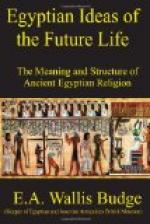sources: I refer to the work, De Iside et
Osiride, of the Greek writer, Plutarch, who flourished
about the middle of the first century of our era.
In it, unfortunately, Plutarch identifies certain
of the Egyptian gods with the gods of the Greeks, and
he adds a number of statements which rest either upon
his own imagination, or are the results of misinformation.
The translation [Footnote: Plutarchi de Iside
et Osirids liber: Graece et Anglice.
By S. Squire, Cambridge, 1744.] by Squire runs as
follows:—
“Rhea, [Footnote: i.e., Nut.] say they, having accompanied Saturn [Footnote: i.e., Seb.] by stealth, was discovered by the Sun, [Footnote: i.e., R[=a].] who hereupon denounced a curse upon her, ’that she should not he delivered in any month or year’—Mercury, however, being likewise in love with the same goddess, in recompense of the favours which he had received from her, plays at tables with the Moon, and wins from her the seventieth part of each of her illuminations; these several parts, mating in the whole five days, he afterwards joined together, and added to the three hundred and sixty, of which the year formerly consisted, which days therefore are even yet called by the Egyptians the Epact or superadded, and observed by them as the birthdays of their gods. For upon the first of them, say they, was OSIRIS born, just at whose entrance into the world a voice was heard, saying, ‘The lord of all the earth is born.’ There are some indeed who relate this circumstance in a different manner, as that a certain person, named Pamyles, as he was fetching water from the temple of Jupiter at Thebes, heard a voice commanding him to proclaim aloud that ‘the good and great king Osiris was then born’; and that for this reason Saturn committed the education of the child to him, and that in memory of this event the Pamylia were afterwards instituted, a festival much resembling the Phalliphoria or Priapeia of the Greeks. Upon the second of these days was AROUERIS [Footnote: i.e., Hera-ur, “Horus the Elder.”] born, whom some call Apollo, and others distinguish by the name of the elder Orus. Upon the third Typho [Footnote: i.e., Set.] came into the world, being born neither at the proper time, nor by the proper place, but forcing his way through a wound which he had made in his mother’s side. ISIS was born upon the fourth of them in the marshes of Egypt, as NEPTHYS was upon the last, whom some call Teleute and Aphrodite, and others Nike—Now as to the fathers of these children, the two first of them are said to have been begotten by the Sun, Isis by Mercury, Typho and Nepthys by Saturn; and accordingly, the third of these superadded days, because it was looked upon as the birthday of Typho, was regarded by the kings as inauspicious, and consequently they neither transacted any business on it, or even suffered themselves to take any refreshment until the evening. They further add, that Typho married




